
23 Children’s Books About Emotions For Kids With Big Feelings
This content contains affiliate links. When you buy through these links, we may earn an affiliate commission.
Emotions can be difficult. For adults, absolutely, but even more so for children. How are they supposed to express the hard ones like grief, anger, or sadness without the language to describe them? Creating a foundation of emotional intelligence has been a goal of mine since before my children were born. Unfortunately, children don’t come with instructions. Even more unfortunately, neither does parenting, not really—not when it comes to handling with our own emotional struggles and our children’s. Thankfully, there are some great works out there that make the murky waters of raising emotionally literate people a little more clear. Here are some of the best children’s books about emotions, for kids and parents alike.
The Feeling Flower follows a flower named Zippy and her feelings throughout the day. How does she feel when it’s sunny, or rainy? This title lets little kids know that a day doesn’t have to be absolutely perfect to be a good day.
Me and My Fear follows a young immigrant girl going to her new place. Her Fear is big and tries to keep her from playing, because how can you play if nobody can understand you? She learns that she is stronger than her fear, and learns how to share her fear with others and make new friends in her new city.
When sadness arrives, what do we do with it? Do we ignore it? Why is it here? This book helps kids realize that sometimes sadness doesn’t go away so quickly, but instead of being afraid of this feeling, they find that they can learn from it.
Listening to My Body is an early mindfulness book. It teaches children to sit down and name their feelings. This helps build their capacity to be mindful, to self regulate, and to develop their emotional resilience. All of Gabi Garcia’s books are incredible. I would recommend them all in this list, but this book is a good starting point.
The Name Jar is about Unhei, a Korean girl in a new school. Rather than telling everyone how to pronounce her name, she asks her classmates to make a name up for her. As she tries out her new names, she realizes that her name has a special significance that she shouldn’t have to give up. This book reminds us to embrace who we really are, even when that seems different from everyone else.
“There will be days when you walk into a room and nobody is like you.” The Day You Begin helps children see the diversity in others. It also helps them acknowledge fear when they do see that everyone is different. The children in the book learn to be vulnerable and share their stories—on the first day of school.
This is the story of how Humpty Dumpty learned how to get back up again. After we fall, getting back up can be scary. We watch Humpty recover outwardly but suffer from still being afraid. It’s a lovely book about how trauma, healing, and emotional resiliency. Things happen, but we will never learn to fly if we can’t let ourselves heal.
Nisha doesn’t know where she belongs. It’s 1947, India has just separated from British rule—and has separated into two countries. She lost her mother when she was young, and because of the tensions between the two new countries, she is now a refugee. This book is a series of her letters to her late mother as she expresses her grief and learns who she is. It’s a great book for kids who are feeling lost.
Genesis has 96 things she hates about herself. She keeps a list. Number 95 is the very dark color of her skin—always commented on by strangers and family. Her family is frequently displaced—leaving their belongings on the sidewalk as they move from one apartment to another. Genesis doesn’t think that she has any good qualities, until a teacher encourages her to sign up for the talent show. But how will Genesis see the spark inside her, when her family is always bringing her down? This is a book about learning how to love yourself against the trauma of your life.
Shouting at the Rain shows us the journey of Ronan and Delsie. Delsie is interested in the weather, lives with her Grammie, and is starting to question everything. Ronan has his own trauma to deal with. Together they learn the difference between anger and sadness, brokenness and wholeness, abandonment and love. Together they can weather any storm.
I hope that you enjoy this list. If you have any parenting books about the emotional life of toddlers, please, I beg you…comment on this and send them to me.
Picture Books About Emotions
Oh, the tamper tantrums that come with toddlers and preschoolers. You know the ones, where you’ve got a hungry and overstimulated little human who just saw her favorite toy at the end cap of the isle you’re trying to rush past in Target. Suddenly the world is over. Suddenly she is kicking and thrashing and screaming and nothing is working. It happens to all of us, and the best of us. Here are some good picture books about emotions to read with toddlers to help them identify what they feel. The Feeling Flower by Lean Dakroub
The Feeling Flower by Lean Dakroub
The Feeling Flower follows a flower named Zippy and her feelings throughout the day. How does she feel when it’s sunny, or rainy? This title lets little kids know that a day doesn’t have to be absolutely perfect to be a good day.
Calm Down Time by Elizabeth Verdick (author) and Marika Heinlen (Illustrator)
Calm Down Time is a sweet board book that give toddlers their space during tamper tantrums. With easy rhymes and warm illustrations, babies are given tools to be able to cope with the most difficult feelings. Me and My Fear by Francesca Sanna
Me and My Fear by Francesca Sanna
Me and My Fear follows a young immigrant girl going to her new place. Her Fear is big and tries to keep her from playing, because how can you play if nobody can understand you? She learns that she is stronger than her fear, and learns how to share her fear with others and make new friends in her new city.
The Feelings Book by Todd Parr
Every face has a feeling attached. This is a simple board book to help us explore what faces we make when we’re feeling strongly. Are you mad? Sad? It’s a fun book to play in the mirror and practice noticing yours and others’ emotions. When Sadness is at Your Door by Eva Eland
When Sadness is at Your Door by Eva Eland
When sadness arrives, what do we do with it? Do we ignore it? Why is it here? This book helps kids realize that sometimes sadness doesn’t go away so quickly, but instead of being afraid of this feeling, they find that they can learn from it.
Grumpy Monkey by Suzanne Lang (Author) and Max Lang (Illustrator)
What happens when we get unexpected feelings that we bottle up? This quirky and funny book explains just does what happen when we all put on a happy face, and teaches children that it’s okay to feel their feelings.Elementary Children’s Books About Emotions
As our children grow, so do their anxieties and frustrations. We start expecting more out of them and often forget that they’re still small. They might not be waking up in the middle of the night anymore, and diapers might be a distant memory, but there is still a lot of uncharted territory when it comes to helping them manage their bodies and their emotions. Listening to My Body by Gabi Garcia
Listening to My Body by Gabi Garcia
Listening to My Body is an early mindfulness book. It teaches children to sit down and name their feelings. This helps build their capacity to be mindful, to self regulate, and to develop their emotional resilience. All of Gabi Garcia’s books are incredible. I would recommend them all in this list, but this book is a good starting point.
The Rough Patch by Brian Lies
The Rough Patch is a book about loss and disappointment—and turning our pain into something beautiful. When Evan’s dog dies, he is devastated. When he tears down his garden in grief, it grows back wild and untamed, and he embraces the strange beauty of it and learns that sometimes we can find beauty in the wild and broken places. The Name Jar by Yangsook Choi
The Name Jar by Yangsook Choi
The Name Jar is about Unhei, a Korean girl in a new school. Rather than telling everyone how to pronounce her name, she asks her classmates to make a name up for her. As she tries out her new names, she realizes that her name has a special significance that she shouldn’t have to give up. This book reminds us to embrace who we really are, even when that seems different from everyone else.
My Heart by Corinna Luyken
My Heart takes children on a beautiful lyrical journey about the feelings of emotions. Sometimes our hearts feel small and afraid, sometimes they’re a puddle, sometimes they’re big and open for the whole world. The Day You Begin by Jacqueline Woodson (Author) and Raphael Lopez (Illustrator)
The Day You Begin by Jacqueline Woodson (Author) and Raphael Lopez (Illustrator)
“There will be days when you walk into a room and nobody is like you.” The Day You Begin helps children see the diversity in others. It also helps them acknowledge fear when they do see that everyone is different. The children in the book learn to be vulnerable and share their stories—on the first day of school.
 After the Fall by Dan Santat
After the Fall by Dan Santat
This is the story of how Humpty Dumpty learned how to get back up again. After we fall, getting back up can be scary. We watch Humpty recover outwardly but suffer from still being afraid. It’s a lovely book about how trauma, healing, and emotional resiliency. Things happen, but we will never learn to fly if we can’t let ourselves heal.
Thank You, Omu by Oge Mora
Thank You, Omu is a book about sharing and recognizing when people give too much of themselves. Children watch as Omu (“queen” in Igbo, but used as “grandma” here) gives parts of her meal to everyone who asks. Omu can make some good stew. It teaches children about thankfulness and being aware of what they consume—as we all live in this world together.What to do When You’re Feeling Blue by Andi Cann
This sweet little book helps children identify the difference between feeling sad and happy, and gives them an opportunity to talk about it as well as offering some lovely self care tips to help them cope with the feelings.Middle Grade Books About Emotions
Here comes another challenge as our growing kids are growing more into their adult selves, i.e. puberty. Stuck in that transition between being a kid and not being a kid anymore, it can be a heavy time for both kids and parents. The emotions get deeper and we are going to be forced to talk about big emotions like love and grief, if we haven’t already. The Night Diary by Veera Hiranandani
The Night Diary by Veera Hiranandani
Nisha doesn’t know where she belongs. It’s 1947, India has just separated from British rule—and has separated into two countries. She lost her mother when she was young, and because of the tensions between the two new countries, she is now a refugee. This book is a series of her letters to her late mother as she expresses her grief and learns who she is. It’s a great book for kids who are feeling lost.
Bridge to Terabithia by Katherine Peterson
Jess and Leslie become quick friends one summer when they create their imaginary land, “Terabithia.” Terabithia exists in the woods behind Leslie’s house, and one day she goes there without Jess—and something unspeakable happens to her. Jess is left to deal with his grief, his loss, his confusion. It’s a book about how we live after the death of our closest person. Genesis Begins Again by Alicia D. Williams
Genesis Begins Again by Alicia D. Williams
Genesis has 96 things she hates about herself. She keeps a list. Number 95 is the very dark color of her skin—always commented on by strangers and family. Her family is frequently displaced—leaving their belongings on the sidewalk as they move from one apartment to another. Genesis doesn’t think that she has any good qualities, until a teacher encourages her to sign up for the talent show. But how will Genesis see the spark inside her, when her family is always bringing her down? This is a book about learning how to love yourself against the trauma of your life.
Merci Suarez Changes Gears by Meg Medina
In this somewhat more lighthearted book, we meet Merci Suarez, a 6th grader in a new school. Merci must navigate the social structure of her new school and deal with jealous peers, her and her brother’s poverty, and a life at home that isn’t better, either. Her grandfather isn’t doing well and NOBODY IS TELLING HER WHY!! It’s a great book that shows kids we all have our unique struggles. All middle schoolers will relate to Merci and her plight.Where the Red Fern Grows by Wilson Rawls
I will say this is an older book, so I don’t know what didn’t age well here, but if you want a book about a deep sense of love and loss for your middle schooler, this is a good one. Billy and his dogs, Old Dan and Lil’ Ann, are inseparable. They soon become famous for their hunting prowess. When tragedy strikes, Billy will have to find hope in the hopeless. Shouting At the Rain by Lynda Mullaly Hunt
Shouting At the Rain by Lynda Mullaly Hunt
Shouting at the Rain shows us the journey of Ronan and Delsie. Delsie is interested in the weather, lives with her Grammie, and is starting to question everything. Ronan has his own trauma to deal with. Together they learn the difference between anger and sadness, brokenness and wholeness, abandonment and love. Together they can weather any storm.
Resources for Parents
First of all, you’re doing an incredible job if you’re here looking for books to teach your children about emotional resiliency. I’m proud of you. Seriously, parenting is difficult on the best days. I am a mom of two preschoolers. I. Am. In. It. Mostly it’s because they’re doing their two- and three-year-old things and I am a broken mess thanks to whatever childhood trauma I had to deal with. There are THOUSANDS of books to tell us how we should be raising our kids. (Yikes.) It’s hard to sift through them. So here are a few that I found helpful in dealing with big emotions in parents (and kids), so that we can move forward with raising kids who can Daniel Tiger the crap out of any situation.Positive Parenting by Rebecca Eanes
This book helps us find true connection with our kids, without yelling and nagging (lol, right?). It’s actually a really great resource about connecting with the human beings we raise—not the clones we’re trying to produce. A quick read too, so it makes a great reference book.Peaceful Parent, Happy Kids by Dr. Laura Markham
Did you know that adults have tantrums, too? Well—I for sure learned the hard way. Dr. Markham is a psychologist to help parents get over themselves. Trust me, we need it. When we can control our own feelings, we can teach our children to control theirs through our example.The Whole Brain Child by Daniel J. Siegel and Tanya Payne Bryson
Our kids literally cannot control their emotions—because their brains aren’t fully developed. Weird. Kids are small humans, after all. Why do we expect them to control themselves like adults do? This is a great book for those of us who struggle with forgetting that we’re raising people who will one day in the future be adults, but not yet.I hope that you enjoy this list. If you have any parenting books about the emotional life of toddlers, please, I beg you…comment on this and send them to me.



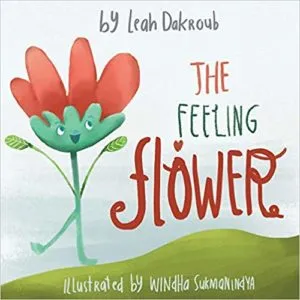 The Feeling Flower
The Feeling Flower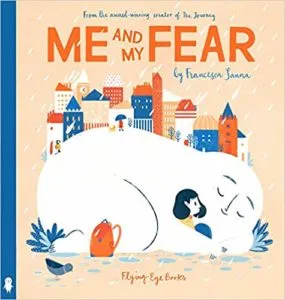 Me and My Fear
Me and My Fear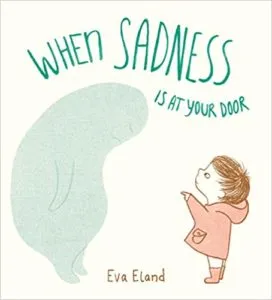 When Sadness is at Your Door
When Sadness is at Your Door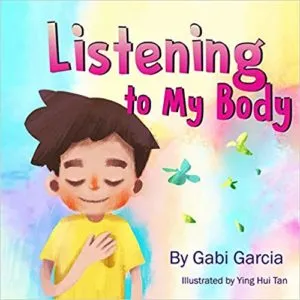
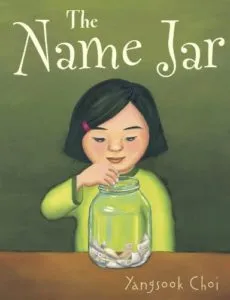 The Name Jar
The Name Jar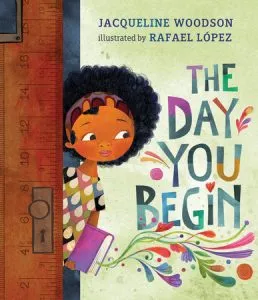 The Day You Begin
The Day You Begin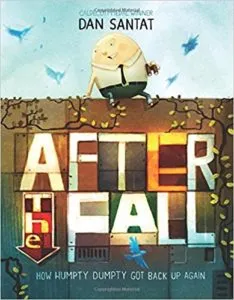 After the Fall
After the Fall 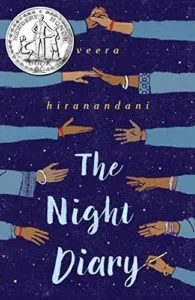 The Night Diary
The Night Diary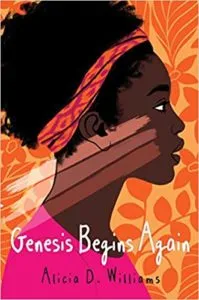 Genesis Begins Again
Genesis Begins Again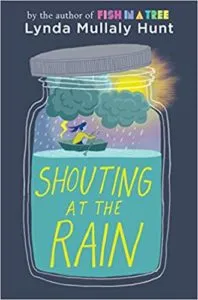 Shouting At the Rain
Shouting At the Rain









